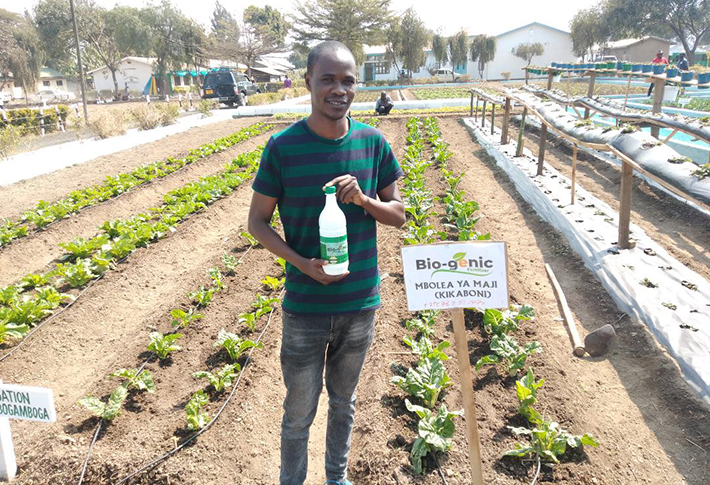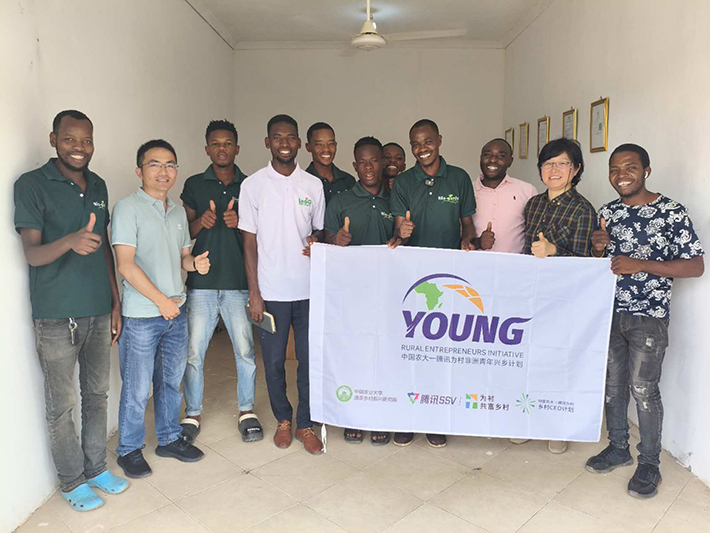From Chinese Campus to African Fields


At the National Agricultural Exhibition in Tanzania’s Dodoma Region in August 2024, one product stood out among hundreds: bio-genic fertiliser. Visitors, including farmers, researchers and government officials, were intrigued by its promise.
The bacteria-based organic fertiliser, made from agricultural waste and seaweed, has demonstrated impressive benefits: lower costs, higher crop yields, reduced need for chemical inputs, and better soil health over time.
However, few visitors knew the man behind this innovation: Amos Benjamin Wandella, a Tanzanian entrepreneur who once studied at China Agricultural University (CAU). Wandella has applied the knowledge and insights gained in China thousands of kilometres away in his home region, contributing to local agricultural development and setting an inspiring example for others.
An idea planted in China
Wandella pursued a master’s degree at CAU between 2015 and 2017 after receiving a scholarship from China’s Ministry of Commerce. It was a turning point in his life.
During his time at CAU, he had the opportunity to learn different innovation approaches, models and strategies, and to travel to various provinces to observe how agriculture had contributed to China’s development.
“My study in China contributed to my passion to turn my innovative ideas into real business,” Wandella told ChinAfrica. “Seeing how China uses agriculture to fight poverty and create jobs opened my eyes to what’s possible in Tanzania.”
He noticed that for many smallholder farmers in his home country, chemical fertilisers were simply too expensive. Learning from China’s cost-effective models - and under the guidance of his professor and other mentors at CAU - Wandella began exploring alternatives to address this challenge. The idea for bio-genic fertiliser was born.
According to Wandella, bio-genic fertiliser has three main advantages: it can reduce production costs for smallholder farmers by more than 50 percent compared to conventional chemical fertilisers; create employment opportunities; and protect the environment by promoting organic solutions that safeguard soil health and support sustainable agricultural development.
Learning and growing
In 2018, Wandella launched his agribusiness in Dar es Salaam, using part of his scholarship savings. However, progress was slow at first. The country’s strict regulations required years of testing and certification. It was not until 2023 - after four years of laboratory and field trials - that his product was officially approved for market use.
A major breakthrough came in November 2024, when Wandella was selected for the inaugural cohort of the CAU-Tencent Young Rural Entrepreneurs Initiative.
“My participation in the CAU-Tencent programme has been pivotal to my entrepreneurial journey, as the experience significantly strengthened the foundation and strategic direction of my agribusiness,” he said.
Intensive training sessions and field visits in Beijing, Guangdong, Fujian and Zhejiang exposed him to innovative agri-tech solutions, business models and digital tools. He also gained practical knowledge in financial management, particularly in budgeting, cost control and investment planning, which has been crucial to ensuring the financial sustainability of the venture.
Additionally, he was introduced to essential tools for developing and streamlining company operating systems, helping him to build a more structured and efficient business workflow, from procurement and production to distribution.
Mentorship remained crucial. With his mentor Zhang Chuanhong’s continued support, Wandella crafted a comprehensive, investor-ready business plan to pursue grant opportunities and strategic partnerships.
“Her mentorship allowed me to refine my business vision, not only to produce affordable, high-quality organic fertiliser, but to create a scalable model that supports sustainable farming, reduces environmental pollution and empowers rural communities,” Wandella told ChinAfrica.

Impact and ambition
Since his participation in the CAU-Tencent programme, Wandella’s agribusiness has grown rapidly. His products have entered 10 new regions across Tanzania, and his customer base has grown from 500 to 750. Production capacity has risen by 40 percent, from 10,000 litres to 14,000 litres, while processing time has been cut in half. Moreover, he established a rural distribution network with 50 agro-dealers, 10 farmer cooperatives and over 100 trained partners. More than 2,000 farmers have been educated on the benefits of bacterial-based organic fertiliser for improving soil health and crop productivity.
His company also forged partnerships with local government agencies, NGOs, development organisations and research institutions. These include the Tanzania Horticulture Association, the Tanzania Organic Agriculture Movement, the Sokoine University of Agriculture and the Tanzania Agricultural Research Institute, among others.
Still, the journey is not without challenges. The company’s equipment remains basic. However, he believes that under African conditions, young entrepreneurs should “start from what we have” rather than blindly pursuing high-end technologies and equipment.
Looking ahead, he plans to expand production capacity, improve product consistency, and spread awareness of organic farming practices.
From Beijing classrooms to Dar es Salaam’s fields, Wandella is a proof that global education can plant the seeds of local change - and that determination, guided by knowledge, can make those seeds grow.


